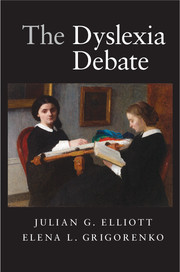Crossref Citations
This Book has been
cited by the following publications. This list is generated based on data provided by Crossref.
Reilly, Sheena
Bishop, Dorothy V. M.
and
Tomblin, Bruce
2014.
Terminological debate over language impairment in children: forward movement and sticking points.
International Journal of Language & Communication Disorders,
Vol. 49,
Issue. 4,
p.
452.
Bishop, D. V. M.
2014.
Ten questions about terminology for children with unexplained language problems.
International Journal of Language & Communication Disorders,
Vol. 49,
Issue. 4,
p.
381.
Whitebread, David
and
Sinclaire-Harding, Lysandra
2014.
All about…: neuroscience and the infant brain.
Nursery World,
Vol. 2014,
Issue. 21,
p.
21.
Stein, John
2014.
Dyslexia: the Role of Vision and Visual Attention.
Current Developmental Disorders Reports,
Vol. 1,
Issue. 4,
p.
267.
Moats, Louisa
2014.
What teachers don't know and why they aren't learning it: addressing the need for content and pedagogy in teacher education.
Australian Journal of Learning Difficulties,
Vol. 19,
Issue. 2,
p.
75.
Elliott, Julian
and
Resing, Wilma
2015.
Can Intelligence Testing Inform Educational Intervention for Children with Reading Disability?.
Journal of Intelligence,
Vol. 3,
Issue. 4,
p.
137.
Coltheart, Max
2015.
What kinds of things cause children’s reading difficulties?.
Australian Journal of Learning Difficulties,
Vol. 20,
Issue. 2,
p.
103.
Cameron, Harriet
2015.
Critical Educational Psychology.
p.
218.
Serry, Tanya Anne
and
Hammond, Lorraine
2015.
What’s in a word? Australian experts’ knowledge, views and experiences using the term dyslexia.
Australian Journal of Learning Difficulties,
Vol. 20,
Issue. 2,
p.
143.
Whitfield, Petronilla
2015.
Towards an emancipatory praxis of pedagogy: supporting acting students with dyslexia when working on Shakespeare.
Voice and Speech Review,
Vol. 9,
Issue. 2-3,
p.
113.
Lakretz, Yair
Chechik, Gal
Friedmann, Naama
and
Rosen-Zvi, Michal
2015.
Probabilistic Graphical Models of Dyslexia.
p.
1919.
Fraga González, Gorka
Žarić, Gojko
Tijms, Jurgen
Bonte, Milene
Blomert, Leo
van der Molen, Maurits W.
and
Amitay, Sygal
2015.
A Randomized Controlled Trial on The Beneficial Effects of Training Letter-Speech Sound Integration on Reading Fluency in Children with Dyslexia.
PLOS ONE,
Vol. 10,
Issue. 12,
p.
e0143914.
Leveroy, Deborah
2015.
‘A date with the script’: exploring the learning strategies of actors who are dyslexic.
Theatre, Dance and Performance Training,
Vol. 6,
Issue. 3,
p.
307.
Svensson, Idor
Fälth, Linda
and
Persson, Bengt
2015.
Reading level and the prevalence of a dyslexic profile among patients in a forensic psychiatric clinic.
The Journal of Forensic Psychiatry & Psychology,
Vol. 26,
Issue. 4,
p.
532.
Cameron, Harriet
and
Billington, Tom
2015.
The discursive construction of dyslexia by students in higher education as a moral and intellectual good.
Disability & Society,
Vol. 30,
Issue. 8,
p.
1225.
Gibbs, Simon
and
Elliott, Julian
2015.
The differential effects of labelling: how do ‘dyslexia’ and ‘reading difficulties’ affect teachers’ beliefs.
European Journal of Special Needs Education,
Vol. 30,
Issue. 3,
p.
323.
Doyle, Nancy
and
McDowall, Almuth
2015.
Is coaching an effective adjustment for dyslexic adults?.
Coaching: An International Journal of Theory, Research and Practice,
Vol. 8,
Issue. 2,
p.
154.
Gold, Andreas
2015.
Lernschwierigkeiten. Wie man einen pädagogisch-psychologischen Dauerbrenner immer wieder aufs Neue befeuern kann.
Zeitschrift für Pädagogische Psychologie,
Vol. 29,
Issue. 3-4,
p.
123.
Troeva, Blagovesta
2015.
Teachers' perception of the differences in the reading profiles of students with dyslexia and the role of dyslexia assessment for an appropriate choice of teaching strategy.
English Studies at NBU,
Vol. 1,
Issue. 2,
p.
27.
Bishop, D. V. M.
2015.
The interface between genetics and psychology: lessons from developmental dyslexia.
Proceedings of the Royal Society B: Biological Sciences,
Vol. 282,
Issue. 1806,
p.
20143139.





